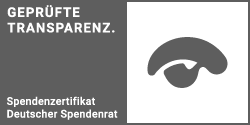
Sustainable community development for WASH, protection and food security
Malteser International (MI) has been supporting people with water, sanitation and hygiene (WASH) activities in Borno, Cross River, Taraba and more recently Adamawa states since 2017 by providing life-saving WASH and protection services. This project implements and integrates life-saving humanitarian measures for people in acute need. The affected population will be supported with improved access to safe and sufficient drinking water supplies, safe, adequate and decent sanitation facilities and information on public health risk mitigation, as well as special hygiene kits to combat cholera, including soap, water containers and water purification tablets. The aim is to reach internally displaced persons, refugees, returnees and households in Borno and Taraba states affected by shocks and systemic restrictions.
The ongoing conflict and recurring flooding in Adamawa (Borno State) have rapidly increased the humanitarian needs of people in and around the conflict and flooded areas. One consequence of the flooding has been an increase in water-borne and vector-borne diseases (living organisms such as mosquitoes or rats), such as cholera, which has exacerbated the need for WASH interventions.
Food insecurity and malnutrition are among the leading causes of the need for humanitarian aid in the BAY states. In 2023, 4.35 million people did not have sufficient access to food, while the number of children who were severely acutely malnourished in Nigeria rose by 140 percent to 2.37 million in 2023 compared to 2022. Overall, around 65 percent of the population in the BAY states require humanitarian support and some live in living conditions that are classified as catastrophically poor (OCHA 2023, AF HIP 2024).
Women and girls are discriminated against as a result of the ongoing crisis in the BAY states. For instance, they have less access to education and economic activities. They are also frequently exposed to gender-based violence in various forms.
Together with the affected population, we pursue the following goals:
- Protection for women and girls against gender-based violence
- Clean drinking water and sanitary facilities for communities
- Better access to food, especially in times of crisis, promoting self-sufficiency and strengthening resilience
WASH
- Implementation of hygiene training/refresher courses
- WASH support in schools through the provision of hygiene items or the construction of WASH facilities
- Supporting global events, including World Handwashing Day, World Toilet Day and World Water Day
- Distribution of basic hygiene kits and replenishment of hygiene kits
- Preparedness for cholera and infectious diseases by distributing cholera kits (including information sheet, water containers, soap, detergent and water purification tablets)
Protection
- Professional advice for the provision of basic psychosocial care
- Professional counseling for the provision of primary mental health care
- Referral of mental health cases by trained volunteers
- Construction of shelters for women and girls in IDP camp, including recreational spaces.
- Prevention of gender-based violence through sensitization campaigns
- Training of community volunteers on gender-based violence prevention measures
- Training of community volunteers on gender-based violence prevention measures in camps
- Training of adolescent boys/girls, gender champions, security guards and community leaders
Food and nutrition security
- Distribution of seeds, planting material, poultry and tools to specific households in the target group
- Training on the use of the distributed seeds/seedlings/planting material and on poultry rearing
Country info
Capital: Abuja
Area: 923,770 km²
Population: approx. 218 Mio.
Project data
Financing: German Federal Foreign Office
Partner: Rhema Care








